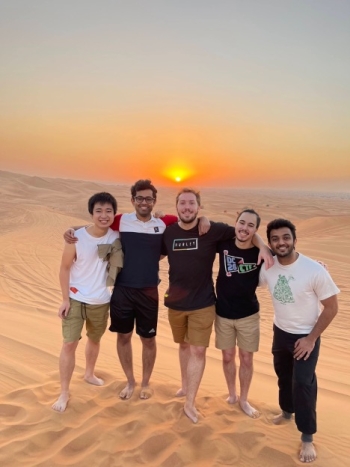Hawaiian PhD student finds community, opportunities at ASU
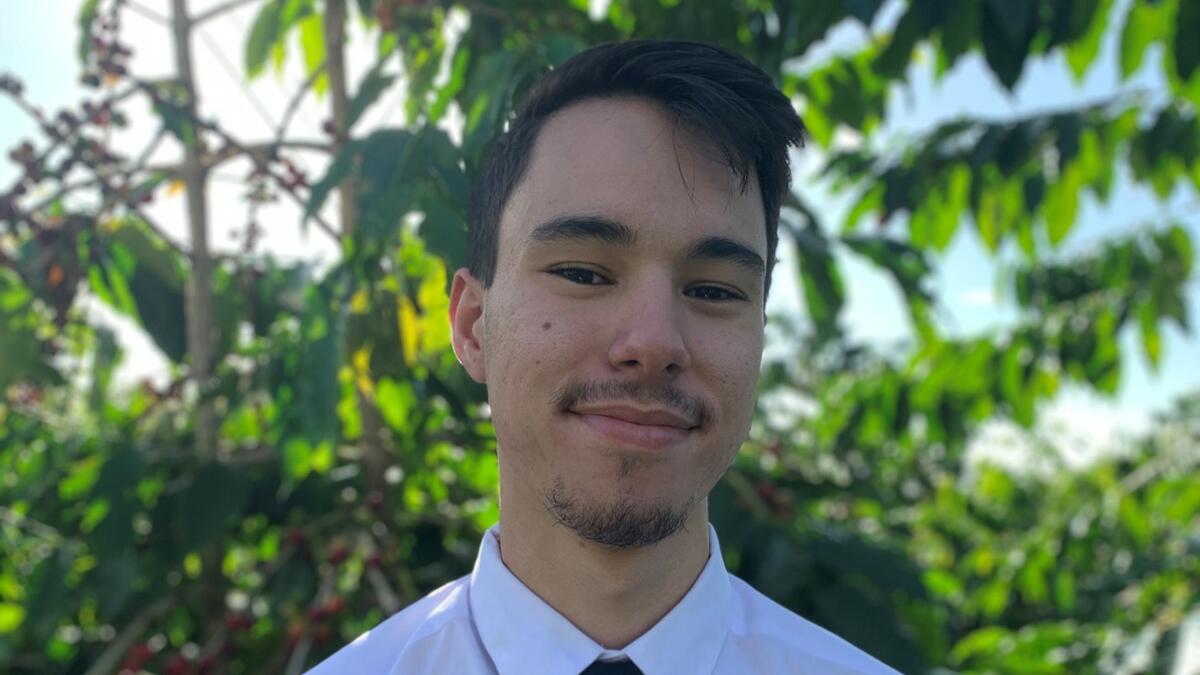
ASU PhD student Zion Leonahenahe Basque. Courtesy photo
By Christopher Barton
When Zion Leonahenahe Basque was choosing where to go to college, he wanted something different from what he knew back home.
So that’s how, in 2017, Basque swapped the beaches of Hawaiʻi for the desert at Arizona State University.
Seven years later, he still calls Tempe home as a PhD student studying computer science. He’s also a research assistant at the SEFCOM Lab at ASU and an active member of the Hawaiian community.
This summer, as many students are making their final college decisions, Zion shares the opportunities and community he found at ASU, how his Hawaiian heritage shapes his work and his advice for other students coming from Hawaiʻi.
Editor's note: Answers have been edited for length and clarity.
Question: Tell me about your experience coming to ASU. What drew you here? Why did you decide to stay for another degree?
Answer: Being from Hawaiʻi, I often get asked, "Why would you come to the desert?" I usually respond: "Because it's so different from Hawaiʻi!" Although I would love to claim that I chose ASU out of that alone, there was more to it. I was broke, and ASU had good tuition. It was close enough to home but not too close. And it was fundamentally different from home.
However, I think there is something more attractive to the question: "Why did you stay?" I stayed, indeed, because of how much my horizons broadened by being present at ASU. It's so utterly different from my old life! … Around every corner in my years at ASU, I found opportunities waiting for me to seize: startups, research labs, exciting colleagues. It's all here to be found.
I decided to stay at ASU because I found a group of like-minded people with the same goals. It was a small but growing group of hackers — the good kind — who enjoyed learning, understanding and exploring technology. It turned out those hackers were also academics: PhD students and professors who have come to be known as hackademics. They ran a research lab and a hacking team here, which I joined in my freshman year of undergrad.
Being from Hawaiʻi, it's easy to see yourself as an outsider on the mainland. … Doing academic research takes that "outsider" feeling to a new level: now, you are not only confused by culture but also by intellectual findings. So you can imagine my relief when I found a group of people (who were) inviting and nonjudgemental. I was free to be me and to learn things that made me curious. They inspired me to push myself, discover new things, and ultimately realize that this environment had been what I loved about ASU. I stayed for the community I had found here.
Q: What was the transition from Kealakekua to Tempe like?
A: It was jarring at first. The climate, people and food differ from everything I experienced at home. It's not a far jump to say I had an easy time relating to the international students who were also new to the mainland. I think the thing I missed the most about home was the people.
However, it was only like that at first. With the sheer size of ASU, it was easy to find an event on campus that interested me nearly every week. Additionally, many students were in the same boat I was: looking for friends in a foreign place. I focused on the things I wanted to achieve and the friends I wanted to make. Once I started doing that, this feeling of isolation melted away.
My advice to others coming from Hawaiʻi would probably be the following:
1. Focus on why you wanted to go to college in the first place. What was your dream? Why are you putting in all this effort to leave home? Use the answers to those questions to find people with similar interests. You can find a club for almost anything on this campus. Spend your time chasing your interests.
2. Don't be afraid to try new things. The friend group I made at ASU came from all over the world: the U.S., India, China, etc. Try to understand and explore their culture. Understanding other cultures makes feeling included and part of a group easier. It can also be enjoyable and a way to broaden your horizons. If you understand the Hawaiian concept of Makawalu (eight eyes), this concept of understanding different perspectives should feel innate.
3. When in doubt, seek help from others in your situation. There are other Hawaiians at ASU, and many of us know each other. I am always happy to help anyone from Hawaiʻi looking for support.
Q: You do a lot to support the Hawaiian community at ASU. Can you tell us a little about this community?
A: I think, as Hawaiians, it's easy for many of us to feel a deep sense of connection to our community. That community pushes me to excel on the mainland and to try to give back that knowledge and support to my people. The support I give back, in the capacity that I can now, is to give other Hawaiians the support I wish I had when I came to ASU. I want to make them feel like they have someone on the mainland who wants them to succeed and is willing to help.
The Hawaiian community at ASU is still very much growing. There have been a few Hawaiian clubs over the years; I think more people have been inspired to come together in each iteration. There has also been a great deal of gathering of Hawaiians who received scholarships from Kamehameha since they are easier to find. I think there is much room for growth, but it's trending in the right direction.
Q: Tell me a little about the work you are doing at ASU?
A: I'm a computer science PhD student and research assistant at the SEFCOM Lab. My research area is in cybersecurity, so I primarily work on ways to make programs more secure. It's a very gratifying job that allows me to explore my interests while giving back to society.
Relatedly, I also play in hacking competitions with my workplace, called CTFs, which are 48-hour events where hackers break into competition-made programs to fine-tune our skills. These two things combined have allowed me to travel the world giving conference talks and playing in finals competitions. I've traveled to places like Poland, Vietnam and even Dubai. Recently, I've given a keynote talk in Taiwan.
I love this job because it allows me to contribute back to society. … While working here, I've contributed to an online platform for cybersecurity education called pwn.college. In doing this, I believe it will be easier for people in Hawaiʻi to have access to high-quality education, all for free.
Q: How has being from Hawaiʻi shaped your work? How has being Native Hawaiian shaped your work?
Being a Native Hawaiian has strongly shaped how I see the world and the goals I've set for myself. As I've said earlier, Hawaiians have a strong sense of community and kuleana (responsibility). That has made me work hard to give back and make research I believe is right. … I believe my ancestors would've wanted me to do that.
Additionally … I make education a priority in my work. I try to make everything as accessible as possible, almost always for free. I've also dedicated much time to lecturing and making materials for students here at ASU. In my long-term goals, I hope to return to Hawaiʻi and bring these educational materials with me.
Lastly, I think being Native Hawaiian has had an effect on the way I present myself. When I travel the world for events, I often think about how I am representing the Native Hawaiian community. For many people at these events, this is the first and possibly last time they will ever interact with a Native Hawaiian. I strive to represent the Hawaiians well and to remind others of how epic we are. To me, it feels like I have all my people behind me, telling me to push forward — imua! It is empowering.
More Sun Devil community
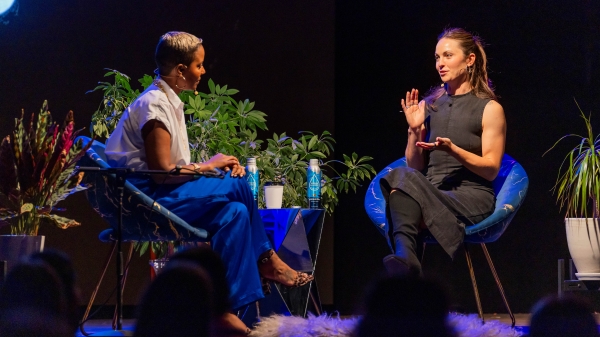
ASU professor on how to have ‘critical conversations’
The best approach for having a critical conversation is to prioritize listening and curiosity above being heard and being right, says an Arizona State University professor who hosts a podcast on the…
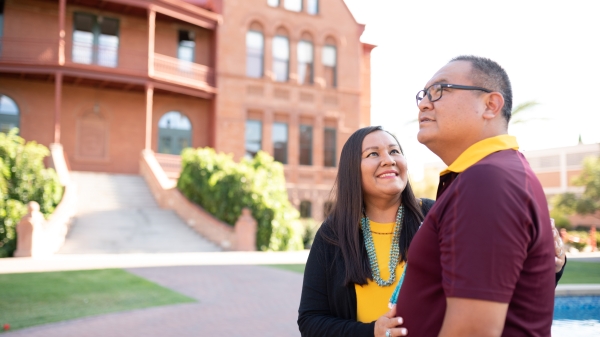
ASU parents get their own classes with ‘Thriving in your Empty Nest’ program
From academic advising to counseling to tutoring centers, Arizona State University offers a vast array of support to help new college students settle into campus life. But what about parents? How can…
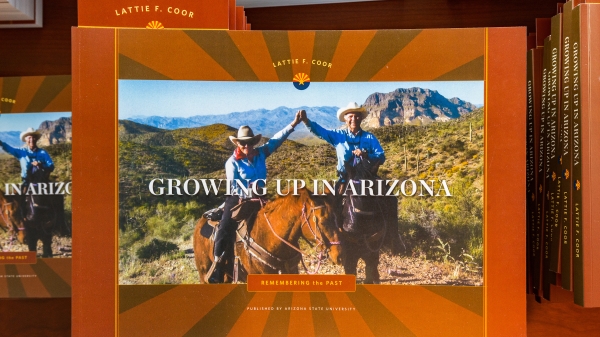
Lattie Coor reflects on lifetime of love for Arizona, ASU in new memoir
Lattie Coor sees his home state of Arizona as a beautiful place of endless opportunity, and as president of Arizona State University, he worked to make sure the people of Arizona saw the university…
